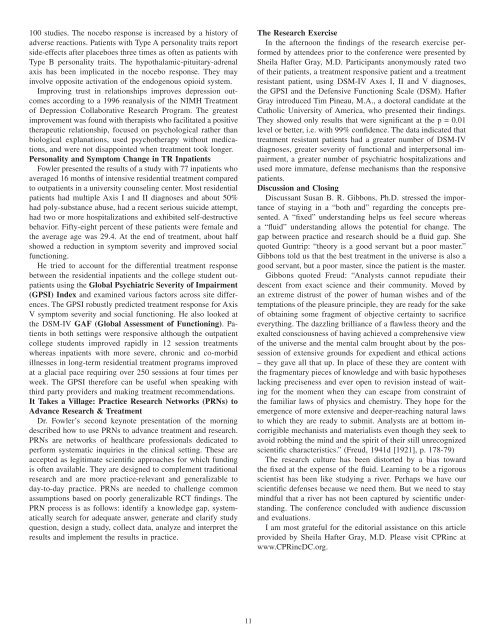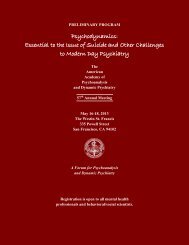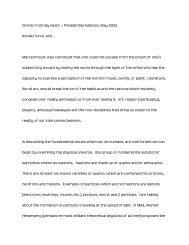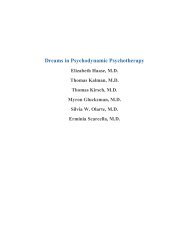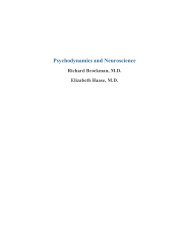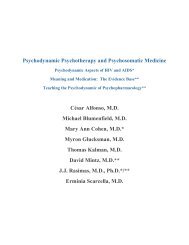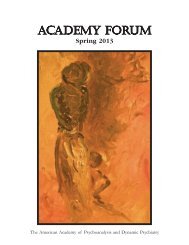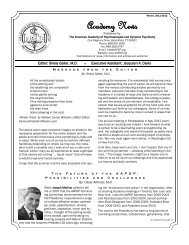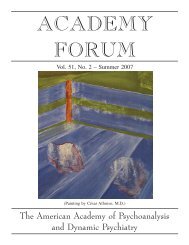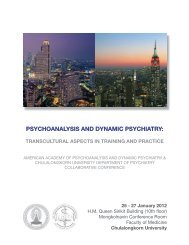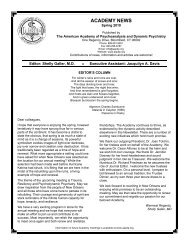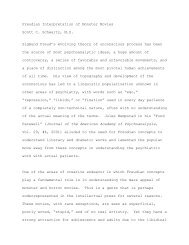ACADEMY FORUM - The American Academy of Psychoanalysis and Dynamic ...
ACADEMY FORUM - The American Academy of Psychoanalysis and Dynamic ...
ACADEMY FORUM - The American Academy of Psychoanalysis and Dynamic ...
You also want an ePaper? Increase the reach of your titles
YUMPU automatically turns print PDFs into web optimized ePapers that Google loves.
100 studies. <strong>The</strong> nocebo response is increased by a history <strong>of</strong><br />
adverse reactions. Patients with Type A personality traits report<br />
side-effects after placeboes three times as <strong>of</strong>ten as patients with<br />
Type B personality traits. <strong>The</strong> hypothalamic-pituitary-adrenal<br />
axis has been implicated in the nocebo response. <strong>The</strong>y may<br />
involve opposite activation <strong>of</strong> the endogenous opioid system.<br />
Improving trust in relationships improves depression outcomes<br />
according to a 1996 reanalysis <strong>of</strong> the NIMH Treatment<br />
<strong>of</strong> Depression Collaborative Research Program. <strong>The</strong> greatest<br />
improvement was found with therapists who facilitated a positive<br />
therapeutic relationship, focused on psychological rather than<br />
biological explanations, used psychotherapy without medications,<br />
<strong>and</strong> were not disappointed when treatment took longer.<br />
Personality <strong>and</strong> Symptom Change in TR Inpatients<br />
Fowler presented the results <strong>of</strong> a study with 77 inpatients who<br />
averaged 16 months <strong>of</strong> intensive residential treatment compared<br />
to outpatients in a university counseling center. Most residential<br />
patients had multiple Axis I <strong>and</strong> II diagnoses <strong>and</strong> about 50%<br />
had poly-substance abuse, had a recent serious suicide attempt,<br />
had two or more hospitalizations <strong>and</strong> exhibited self-destructive<br />
behavior. Fifty-eight percent <strong>of</strong> these patients were female <strong>and</strong><br />
the average age was 29.4. At the end <strong>of</strong> treatment, about half<br />
showed a reduction in symptom severity <strong>and</strong> improved social<br />
functioning.<br />
He tried to account for the differential treatment response<br />
between the residential inpatients <strong>and</strong> the college student outpatients<br />
using the Global Psychiatric Severity <strong>of</strong> Impairment<br />
(GPSI) Index <strong>and</strong> examined various factors across site differences.<br />
<strong>The</strong> GPSI robustly predicted treatment response for Axis<br />
V symptom severity <strong>and</strong> social functioning. He also looked at<br />
the DSM-IV GAF (Global Assessment <strong>of</strong> Functioning). Patients<br />
in both settings were responsive although the outpatient<br />
college students improved rapidly in 12 session treatments<br />
whereas inpatients with more severe, chronic <strong>and</strong> co-morbid<br />
illnesses in long-term residential treatment programs improved<br />
at a glacial pace requiring over 250 sessions at four times per<br />
week. <strong>The</strong> GPSI therefore can be useful when speaking with<br />
third party providers <strong>and</strong> making treatment recommendations.<br />
It Takes a Village: Practice Research Networks (PRNs) to<br />
Advance Research & Treatment<br />
Dr. Fowler’s second keynote presentation <strong>of</strong> the morning<br />
described how to use PRNs to advance treatment <strong>and</strong> research.<br />
PRNs are networks <strong>of</strong> healthcare pr<strong>of</strong>essionals dedicated to<br />
perform systematic inquiries in the clinical setting. <strong>The</strong>se are<br />
accepted as legitimate scientific approaches for which funding<br />
is <strong>of</strong>ten available. <strong>The</strong>y are designed to complement traditional<br />
research <strong>and</strong> are more practice-relevant <strong>and</strong> generalizable to<br />
day-to-day practice. PRNs are needed to challenge common<br />
assumptions based on poorly generalizable RCT findings. <strong>The</strong><br />
PRN process is as follows: identify a knowledge gap, systematically<br />
search for adequate answer, generate <strong>and</strong> clarify study<br />
question, design a study, collect data, analyze <strong>and</strong> interpret the<br />
results <strong>and</strong> implement the results in practice.<br />
<strong>The</strong> Research Exercise<br />
In the afternoon the findings <strong>of</strong> the research exercise performed<br />
by attendees prior to the conference were presented by<br />
Sheila Hafter Gray, M.D. Participants anonymously rated two<br />
<strong>of</strong> their patients, a treatment responsive patient <strong>and</strong> a treatment<br />
resistant patient, using DSM-IV Axes I, II <strong>and</strong> V diagnoses,<br />
the GPSI <strong>and</strong> the Defensive Functioning Scale (DSM). Hafter<br />
Gray introduced Tim Pineau, M.A., a doctoral c<strong>and</strong>idate at the<br />
Catholic University <strong>of</strong> America, who presented their findings.<br />
<strong>The</strong>y showed only results that were significant at the p = 0.01<br />
level or better, i.e. with 99% confidence. <strong>The</strong> data indicated that<br />
treatment resistant patients had a greater number <strong>of</strong> DSM-IV<br />
diagnoses, greater severity <strong>of</strong> functional <strong>and</strong> interpersonal impairment,<br />
a greater number <strong>of</strong> psychiatric hospitalizations <strong>and</strong><br />
used more immature, defense mechanisms than the responsive<br />
patients.<br />
Discussion <strong>and</strong> Closing<br />
Discussant Susan B. R. Gibbons, Ph.D. stressed the importance<br />
<strong>of</strong> staying in a “both <strong>and</strong>” regarding the concepts presented.<br />
A “fixed” underst<strong>and</strong>ing helps us feel secure whereas<br />
a “fluid” underst<strong>and</strong>ing allows the potential for change. <strong>The</strong><br />
gap between practice <strong>and</strong> research should be a fluid gap. She<br />
quoted Guntrip: “theory is a good servant but a poor master.”<br />
Gibbons told us that the best treatment in the universe is also a<br />
good servant, but a poor master, since the patient is the master.<br />
Gibbons quoted Freud: “Analysts cannot repudiate their<br />
descent from exact science <strong>and</strong> their community. Moved by<br />
an extreme distrust <strong>of</strong> the power <strong>of</strong> human wishes <strong>and</strong> <strong>of</strong> the<br />
temptations <strong>of</strong> the pleasure principle, they are ready for the sake<br />
<strong>of</strong> obtaining some fragment <strong>of</strong> objective certainty to sacrifice<br />
everything. <strong>The</strong> dazzling brilliance <strong>of</strong> a flawless theory <strong>and</strong> the<br />
exalted consciousness <strong>of</strong> having achieved a comprehensive view<br />
<strong>of</strong> the universe <strong>and</strong> the mental calm brought about by the possession<br />
<strong>of</strong> extensive grounds for expedient <strong>and</strong> ethical actions<br />
– they gave all that up. In place <strong>of</strong> these they are content with<br />
the fragmentary pieces <strong>of</strong> knowledge <strong>and</strong> with basic hypotheses<br />
lacking preciseness <strong>and</strong> ever open to revision instead <strong>of</strong> waiting<br />
for the moment when they can escape from constraint <strong>of</strong><br />
the familiar laws <strong>of</strong> physics <strong>and</strong> chemistry. <strong>The</strong>y hope for the<br />
emergence <strong>of</strong> more extensive <strong>and</strong> deeper-reaching natural laws<br />
to which they are ready to submit. Analysts are at bottom incorrigible<br />
mechanists <strong>and</strong> materialists even though they seek to<br />
avoid robbing the mind <strong>and</strong> the spirit <strong>of</strong> their still unrecognized<br />
scientific characteristics.” (Freud, 1941d [1921], p. 178-79)<br />
<strong>The</strong> research culture has been distorted by a bias toward<br />
the fixed at the expense <strong>of</strong> the fluid. Learning to be a rigorous<br />
scientist has been like studying a river. Perhaps we have our<br />
scientific defenses because we need them. But we need to stay<br />
mindful that a river has not been captured by scientific underst<strong>and</strong>ing.<br />
<strong>The</strong> conference concluded with audience discussion<br />
<strong>and</strong> evaluations.<br />
I am most grateful for the editorial assistance on this article<br />
provided by Sheila Hafter Gray, M.D. Please visit CPRinc at<br />
www.CPRincDC.org.<br />
11


